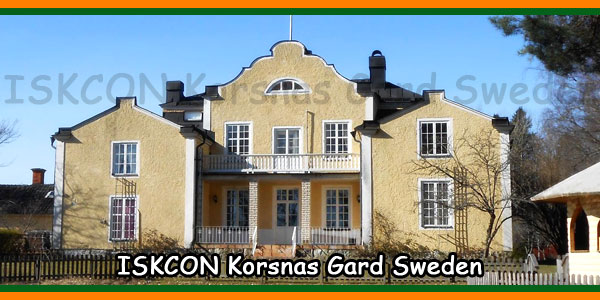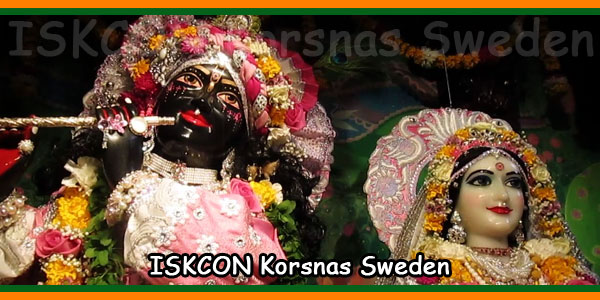Sri Sri Gandharvika Giridhari Grodinge temple timings:
4:30 AM to 8:00 PM
The altar Timings:
4:30 AM – 5:00 AM
7:30 AM – 7:55 AM
8:30 AM – 12:55 PM
1:30 PM – 6:25 PM
7:00 PM – 7:20 PM

Grodinge ISKCON Schedule:
4:30 AM – Mangal Arati (Early morning prayer)
5:00 AM – Tulasi Puja (Worship of the tulasi plant)
5:15 AM – Japa Meditation (Private meditation and prayer through the chanting of the Hare Krishna maha-mantra on beads)
7:30 AM – Guru-puja and Kirtan (Worship of Srila Prabhupada and congregational chanting and dancing)
7:45 AM – Deity Greeting (Welcoming of Gandharvika-Giridhari after They have been dressed and decorated for the day)
8:00 AM – Srimad-Bhagavatam lecture (Class on the philosophy of Krishna Consciousness based on the Vedic scriptures)
1:30 PM – Raj-bhoga-arati ceremony
7:00 PM – Gaura Arati (Evening prayer)
Sunday Feast:
Back in 1966 Srila Prabhupada introduced the “Sunday love-feast” where he would personally cook for sometimes more than 50 devotees and guests and would serve them a variety of tasty vegetarian preparations. But there was more to the “Sunday Feast” than just the feast. Srila Prabhupada would also sing the Hare Krishna maha-mantra with the guests and give a lecture on “Bhagavad-gita”.
Soon this weekly event was celebrated in all ISKCON temples around the world.
Here at New Radhakund, Korsnäs Gård, we also have a Sunday Feast. It starts at 13:30.
Please come and enjoy the atmosphere in the association of people interested in genuine spirituality and a meaningful life.
Worship DEITIES: Soon after founding the Hare Krishna movement, Srila Prabhupada established the process of Deity worship as an integral practice in his fledgling society. Just as he delivered the message of Lord Krishna intact, so he presented the process of Deity worship as it has been performed for thousands of years, seeing it as a practical means by which his followers could apply the essential principle of Krishna consciousness: to offer everything to Krishna.
We are spirit souls, part and parcel of God, and therefore His eternal servants. When we forget this vital part of our nature we fall into material illusion. By His causeless mercy Krishna descends in different forms (avataras) to remind us of our real identity. We may lack the spiritual vision to directly perceive God, and so Deity worship provides an easy method by which we can approach and serve the Lord. In Sanskrit the Deity is called archa-avatara: God descending as the Deity to accept our service and worship.
Whenever Krishna descends as an avatara He enjoys wonderful pastimes with His devotees. Similarly, the archa-avatara also enjoys pastimes with those who serve Him. The Deity is not simply an idol made of stone or brass. Sincere worshipers recognize the descent of Krishna into the Deity and serve this, His personal manifestation.

SHILAS: When you look at the right side of our altar, you will notice a few “smiling stones” and may wonder what they are. These are our beloved shilas. The Sanskrit word shila means “stone.” The largest shila on our altar is from Govardhan, a special place in Vrindavan, India. The others (shalagrams) are from the famous Kali Gandaki River in the Himalayas of present-day Nepal. Each shila is a special form of Vishnu – which form can be identified by the shila’s markings, especially the chakras. Shila worship is quite ancient. In the Skanda Purana it is stated, “The Lord resides in many worshipable forms, but of all forms the shalagrama-shila is the best.”
Srila Prabhupada encouraged his followers who are able to perform steady and careful service to worship shilas. Followers of the Gaudiya Vaishnava tradition, of which the International Society for Krishna Consciousness is a part, accept shalagrama- and Govardhan-shilas as nondifferent from the body of Sri Krishna, the Supreme Personality of Godhead. These are no ordinary stones, because the Lord is present in them. Therefore the devotees worship these shilas exactly as they worship the Deity of Krishna in the temple.
TULASI Pooja:Tulasi is Krishna’s favorite plant, so tulasi plants and their leaves are very important in the practice of devotional service. Devotees are recommended to water the tulasi tree every day and to collect the leaves for their worship of the Deity. We offer tulasi leaves with each and every food preparation, we decorate Krishna’s feet with tulasi leaves and flowers (manjaris), and we use tulasi wood to make the beads all Gaudiya Vaishnavas wear around their necks and use for chanting.
Srila Prabhupada often gave worship of tulasi as an example of a simple devotional act we can do to satisfy Krishna. Since growing tulasi is so pleasing to Krishna, we can sow tulasi seeds and water the plant. Thus even the poorest person can offer service. Tulasi, or Srimati Tulasi Devi as she is known to Gaudiya Vaishnavas, is a goddess who easily grants devotion to Krishna; therefore we pray for her mercy.
FOOD: Cooking and offering food is an essential part of Deity worship. In fact, a devotee cannot imagine Deity worship without cooking. Lord Krishna is a vegetarian. In the Bhagavad-gita He says that if one offers him with love and devotion a leaf, a flower, fruit, or a little water, He will accept the offering. Srila Prabhupada explains that Krishna does not need anything from us – God is self-sufficient – and yet He accepts His devotees’ offerings in an exchange of love. The devotees want to offer their food to Krishna before eating it since Krishna is the source of all eatables, and Krishna reciprocates by accepting the food and spiritualizing it.
We offer palatable dishes to the Deities five times a day. Each offering follows a standard menu based on Vedic tradition. The priest prepares separate silver plates for Lord Nityananda, Lord Chaitanya, Srimati Radharani, and Sri Krishna, and serves a portion of each preparation. On each plate other than Srimati Radharani’s plate, the priest places a tulasi leaf on each preparation. Then mantras are recited and the offering made. Afterwards, devotees and guests are invited to partake of the sanctified food. In this way, even eating becomes an act of devotion.
Address:
ISKCON
Korsnas Gard,
14792 Grodinge,
Sodermanland,
Sweden – 14792.
Reception: +46-8-53029800
Fax: +46-8-53025062
email: info@bbt.se
info@bbt.se